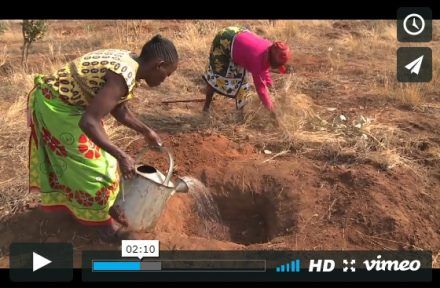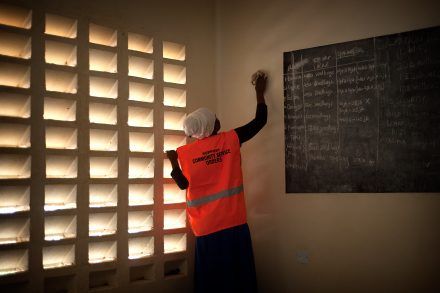
‘Going to prison would have been a big problem as I have lots of people who depend on me.’ ‘My granddaughter, who I take care of, became pregnant when I was in custody and has now left school, and I am blamed for this.’
(Voices of women interviewed within the project).
The emotional, social and economic consequences of imprisonment experienced by women, even for short periods, are acute and enduring. They extend to their families, and in particular their children.
Typically, women are convicted of petty crimes closely linked to poverty, and gender-sensitive alternatives therefore carry a huge potential to avoid imprisonment. However, non-custodial sentences globally have been almost exclusively created for men, by men, and the differing needs and experiences of women completing these sentences have been largely overlooked.
To address this gap, since 2015, Penal Reform International has been conducting a pioneering, multifaceted project which focuses on the experiences of women completing non-custodial sentences – specifically community service orders and probation orders – in Kenya, and the  investigation of how to best adopt a gender-sensitive approach. The project was devised and implemented as a partnership with the Kenya Probation and Aftercare Service (KPAS), and funded by the Thailand Institute of Justice (TIJ).
investigation of how to best adopt a gender-sensitive approach. The project was devised and implemented as a partnership with the Kenya Probation and Aftercare Service (KPAS), and funded by the Thailand Institute of Justice (TIJ).
The overall objectives of the project were to:
- Develop and pilot gender-sensitive community service and probation orders, based on evidence and consultation with women offenders.
- Contribute to Sustainable Development Goals 5 (achieve gender equality and empower all women and girls) and 16 (provide access to justice for all).
To achieve these objectives, the project encompassed several activities and phases. The project was implemented with a view to developing a model that is replicable across an international context.
Model for reform
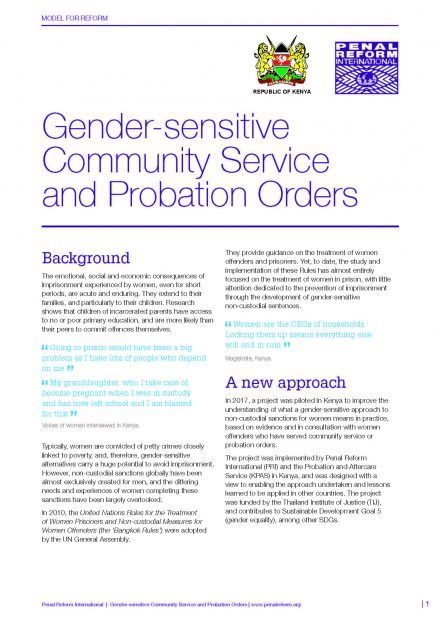 The model for reform documents the overall experiences and findings of this project.
The model for reform documents the overall experiences and findings of this project.
It lays out 10 key steps to take when replicating the project in other countries, in order to introduce a gender-sensitive approach to non-custodial sentences.
In order to make the findings of the research conducted in Kenya accessible and adaptable elsewhere, lessons learned were distilled from the project research report.
Community service and probation for women: Lessons and recommendations based on a study in Kenya
This briefing draws on research from Kenya and other studies on women in the criminal justice system, to outline lessons and recommendations on designing and implementing community service and probation for women, in line with the UN Bangkok Rules. Available in English and Swahili.
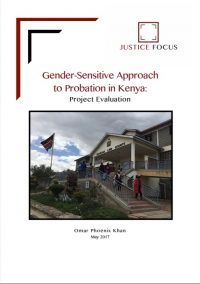 External evaluation
External evaluation
The project was evaluated externally, in order to provide feedback from key stakeholders on the relevance, effectiveness and sustainability of the materials created, and to identify recommendations for applying learning within Kenya and in other countries.
An overview of the external evaluation, which outlines the key findings and recommendations, can be found here.
The following resources were developed as part of the project, and made available for use in other countries.
Community service and probation for women: a study in Kenya
A research report investigating the experiences and recommendations of women offenders who have served community service and probation orders in Kenya. The report identifies the challenges women face and makes recommendations for improving the gender-sensitivity of the community sanctions system.
Short film: ‘Equal justice’: making community sanctions work for women in Kenya
‘I learned how to live with other people in the community. I learned how to survive without committing other offences.’ (Woman serving a probation order).
A short film was produced which highlights the benefits – as well as the challenges – experienced by women serving community service and probation orders in Kenya.
Guidelines for social investigations and pre-sentence reports
Guidelines for incorporating a gender-sensitive approach to social enquiries and pre-sentencing reports. These guidelines were produced using feedback from relevant stakeholders, as well as probation offices in two pilot locations in Kenya (Kisumu and Nakuru).
‘I used to treat them just as offenders. Now I have a better understanding. I am more sympathetic and find out who they are and why they may have committed the offence. The women have been more accepting of my questions and open up more.’
(Probation officer in Nakuru)
Workshop: Training module on community sanctions for women offenders in Kenya
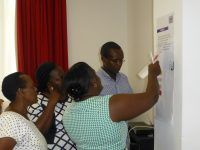
Training for probation officers.
A half-day workshop for probation officers and relevant stakeholders, to sensitise them regarding the specific background and situation of women offenders, and demonstrate how social enquiries, pre-sentence reports and the supervision of community sanctions can be designed in a gender-sensitive way.
Blogs
Paul Kinge’e, County Probation Director in Nakuru, Kenya, explains why a gender-sensitive approach is needed.
Omar Phoenix Khan, who carried out the external evaluation of this project, outlines eight key points to consider when implementing a gender-sensitive approach to probation.
Sign up to our quarterly e-newsletter on women in the criminal justice system
Our quarterly Bangkok Rules e-newsletter highlights news and developments from PRI and around the world on women in the criminal justice system, and the implementation of the UN Bangkok Rules.
Sign up or read previous e-bulletins here.
Related Resources
- Short Guide to the Bangkok Rules: a short illustrated guide to the United Nations Rules for the Treatment of Female Prisoners and Non-custodial Measures for Women Offenders (available in five languages).
- PRI’s two-year ExTRA project (Excellence in Training on Rehabilitation in Africa), which tested a new model for effective delivery of community service orders in Kenya, Tanzania and Uganda. The project’s manager, Omar Phoenix Khan, discusses 10 lessons to improving alternatives to prison in East Africa.
- Animation: Is prison always the solution? This short animated film looks at the damaging impact of the unnecessary use of imprisonment around the world.
Main photo: © Will Boase 2015
